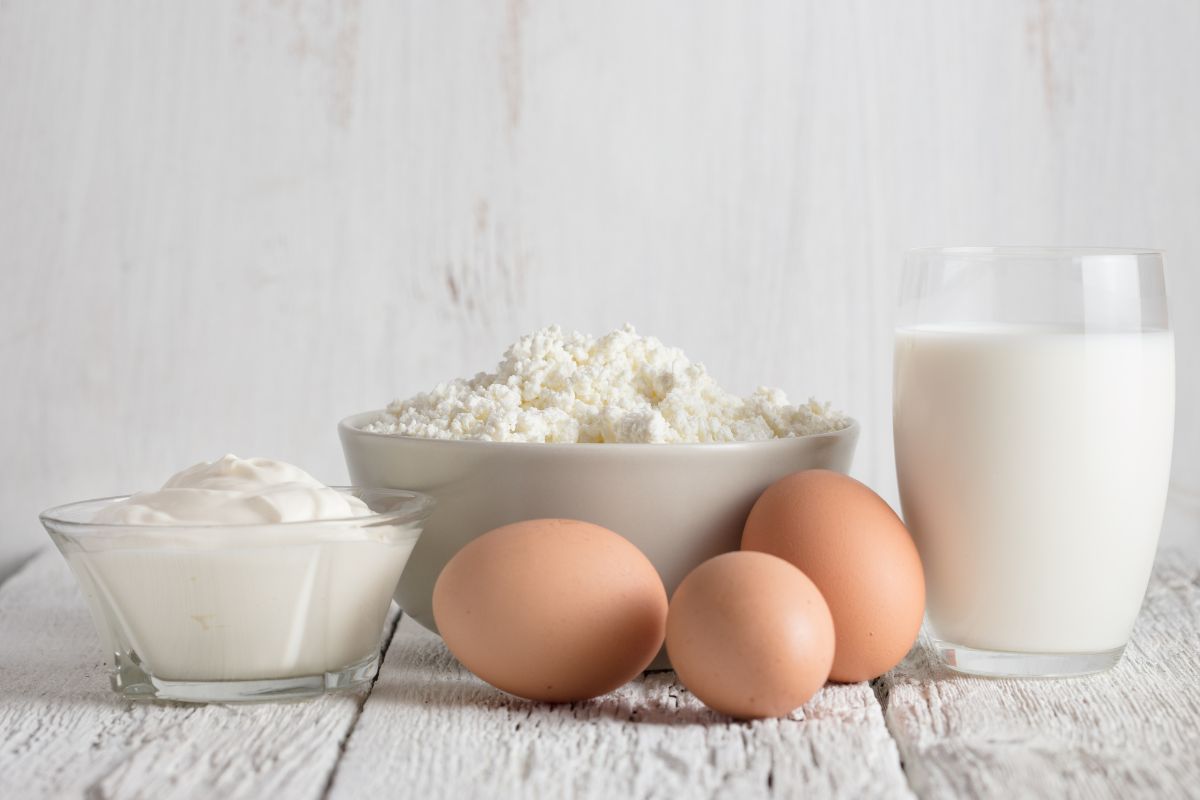In the realm of food categorization, there are certain terms that we often use interchangeably without giving them much thought.
One such pair of words that has managed to cause confusion among many is “eggs” and “dairy.”

People frequently associate eggs with dairy, assuming that they belong to the same food group. However, the reality is quite different. The question that often arises is, are eggs dairy?
To unravel this mystery, we need to delve into the definitions and classifications of both eggs and dairy, exploring their origins, nutritional compositions, and their roles in various dietary practices.
By the end of this comprehensive exploration, you will have a clearer understanding of the fundamental distinctions between eggs and dairy, shedding light on an age-old confusion and ensuring that you make informed choices about the foods you consume.
Understanding Dairy
To begin our exploration, it is crucial to establish a firm grasp on the concept of dairy. Dairy typically refers to products that originate from the milk of mammals, primarily cows, sheep, and goats.
The term encompasses a wide range of foods, including milk, cheese, yogurt, butter, and cream. These products are derived by processing and manipulating animal milk through various methods like pasteurization, fermentation, and churning.
Dairy has been a significant part of human diets for centuries, providing a valuable source of essential nutrients such as calcium, protein, and vitamins.
Its versatility allows for its inclusion in various culinary preparations, making it an integral component of many cuisines worldwide.
Decoding Eggs
Now, let’s shift our focus to eggs. Eggs, contrary to popular belief, are not considered part of the dairy food group. They are, in fact, classified as a separate category altogether.
Eggs are the reproductive structures produced by female animals, primarily birds, including chickens, ducks, and quails. The eggs we commonly consume come from chickens.
The nutritional composition of eggs is quite distinct from dairy products. Eggs are rich in high-quality proteins, essential vitamins (such as vitamin B12 and vitamin D), minerals (including selenium and phosphorus), and healthy fats.
They are widely regarded as a complete protein source due to their amino acid profile, which provides all the essential amino acids our bodies need.
Eggs And Dairy: Key Distinctions
While eggs and dairy products may share certain similarities in terms of their nutrient content and culinary uses, several key distinctions set them apart.
One of the most fundamental differences lies in their sources. Dairy products are derived from animal milk, while eggs are formed within the reproductive systems of female birds.
Furthermore, allergies and dietary restrictions associated with eggs and dairy differ significantly.
Lactose intolerance, for instance, is a common condition where the body has difficulty digesting lactose, a sugar present in dairy products.
On the other hand, egg allergies primarily manifest as a reaction to proteins found in eggs, most commonly ovalbumin. Individuals with egg allergies may experience various symptoms ranging from mild discomfort to severe allergic reactions.
Are Eggs Dairy?
The answer to the question “Are eggs dairy?” is a resounding no. Despite the occasional confusion and the tendency to group them together, eggs and dairy are distinct categories of food.
While dairy refers to products made from animal milk, eggs are reproductive structures laid by birds. Understanding these differences is crucial for dietary choices, allergies, and lifestyle preferences.
By gaining a deeper understanding of the unique characteristics and qualities of eggs and dairy, you are empowered to make informed decisions about your diet.
Whether you are seeking alternative sources of protein or managing dietary restrictions, this knowledge allows you to navigate the culinary landscape with confidence, ensuring that you choose the foods that align with your health and nutritional goals.
Eggs And Dairy Health Benefits

Eggs and dairy products both offer numerous health benefits, each with its unique set of nutritional advantages. Let’s explore the specific benefits associated with eggs and dairy:
Health Benefits Of Eggs
- Excellent Protein Source: Eggs are considered a complete protein source, meaning they contain all the essential amino acids our bodies require. Protein is crucial for various bodily functions, including muscle growth, tissue repair, and hormone production.
- Essential Nutrients: Eggs are packed with essential vitamins and minerals such as vitamin B12, vitamin D, selenium, phosphorus, and choline. These nutrients contribute to brain health, immune function, bone strength, and cellular processes.
- Eye Health: Eggs contain lutein and zeaxanthin, two antioxidants that have been associated with reducing the risk of age-related macular degeneration and promoting good eye health.
- Heart Health: Contrary to previous concerns about their cholesterol content, studies suggest that moderate egg consumption does not significantly impact heart health in most individuals. Moreover, eggs are a source of unsaturated fats, which can contribute to a healthy lipid profile when consumed as part of a balanced diet.
- Weight Management: Eggs are highly satiating, meaning they make you feel fuller for longer periods, which can help reduce calorie intake and support weight management efforts.
Health Benefits Of Dairy
- Bone Health: Dairy products, especially milk and cheese, are well-known for their calcium content, a mineral essential for building and maintaining strong bones and teeth. Additionally, dairy products provide vitamin D, which aids in calcium absorption.
- Muscle Growth and Repair: Dairy is a natural source of high-quality proteins, which are crucial for muscle growth, repair, and recovery after physical activity.
- Blood Pressure Regulation: Some studies suggest that the consumption of low-fat dairy products may be associated with lower blood pressure levels, which can help reduce the risk of hypertension and related cardiovascular issues.
- Improved Digestive Health: Certain dairy products, such as yogurt and kefir, contain probiotics—beneficial bacteria that promote a healthy gut microbiome and aid in digestion.
- Nutrient Density: Dairy products, including milk and yogurt, provide a range of essential nutrients, including calcium, potassium, phosphorus, vitamins B2 (riboflavin), B5 (pantothenic acid), and B12. These nutrients play vital roles in energy metabolism, nervous system function, and red blood cell production.
Final Thoughts
The question of whether eggs are considered dairy has been thoroughly explored, and the answer is clear: eggs are not dairy.
While the confusion may stem from their occasional similarities in nutrient composition and culinary uses, eggs and dairy are distinct food categories.
By gaining clarity on the question of whether eggs are dairy, individuals can make informed decisions about their dietary preferences, nutritional needs, and health goals.
Whether seeking alternative protein sources or managing dietary restrictions, this knowledge empowers individuals to navigate their food choices confidently.
- How To Reheat A Cheesesteak - November 5, 2023
- What Are Three Must Have Kitchen Knives? - September 22, 2023
- How To Protect Edges Of Pie Crust - June 15, 2023








